Times staff report
Some of the greatest individuals in Black history have delivered some of the most significant speeches in American history. Their names and words are iconic.
In the 1800s, Sojourner Truth—born into slavery, and dedicated to the causes of abolition and obtaining equal rights for women and men—delivered “Ar’n’t I a Woman” (1851); and Frederick Douglass—social reformer, abolitionist, orator, writer, and statesman—presented “What to the Slave is the Fourth of July” (1852).
As we near the end of Black History Month and recognize how African American culture has profoundly shaped American culture — in music and art, literature and sports, business and politics – we look some of the greats who left their mark on history through noteworthy speeches.
In 1909, Ida B. Wells—journalist, abolitionist, and feminist who led an anti-lynching crusade in the 1890s—delivered “Lynching Our National Crime.” In 1906, William Edward Burghardt “W. E. B.” Du Bois—sociologist, historian, Civil Rights activist, Pan-Africanist, author, writer, and editor—spoke about the “Men of Niagara.” And in 1922, Marcus Mosiah Garvey Jr.—proponent of Black nationalism in Jamaica and founder of the Universal Negro Improvement Association (UNIA)—gave an oration about “The Principles of the Universal Negro Improvement Association.”
The Rev. Dr. Martin Luther King Jr., the most visible spokesperson and leader in the Civil Rights Movement, captivated a massive Washington, D.C., crowd with his 1963 “I Have a Dream” speech. And Barack Obama—the 44th President of the United States and the first African-American to assume the presidency—addressed the role race has played in the nation’s history in 2008’s “A More Perfect Union.”
The long tradition of African-American oratory is described perfectly by Joseph C. Price, founder and president of North Carolina’s Livingston College, during his address to the National Education Association’s annual convention held in Minneapolis in 1890: “If I had a thousand tongues, and each tongue were a thousand thunderbolts, and each thunderbolt had a thousand voices, I would use them all today to help you understand a loyal and misrepresented and misjudged people.”
Those words sum up the following excerpts from seven noteworthy speeches given by African-Americans throughout history.
To read dozens more iconic speeches in Black history, click here.
Sojourner Truth—“Ar’nt I a Woman?” (1851) 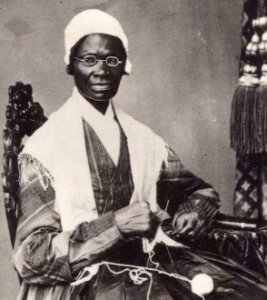
Sojourner Truth
Sojourner Truth (c. 1797–1883) was arguably the most famous of the 19th century’s Black women orators. Born into slavery in New York and freed in 1827 under the state’s gradual emancipation law, she dedicated her life to abolition and the struggle for equal rights for women and men. Scholars agree that “Ar’n’t I a Woman?” was given at the Women’s Rights Convention in Akron, Ohio, on May 29, 1851. After that, there is much debate about what Truth said and how she said it. The most-quoted version of the speech was published in the 1875 edition of Truth’s Narrative (which was written by others) and in Elizabeth Cady Stanton’s 1881 “History of Woman Suffrage,” both of which were published more than two decades after the speech was delivered. The Salem, Ohio, Anti-Slavery Bugle published its rendering of Truth’s speech on June 21, 1851, within a month of her presentation, so many historians believe it to be the more accurate account. Still, both versions rely on the interpretations of others. Since no written transcript of the speech has appeared, the words Truth actually spoke will probably never be known, according to historian Nell Painter.
Well, children, where there is so much racket there must be something out of kilter. I think that ’twixt the Negroes of the South and the women at the North, all talking about rights, the white men will be in a fix pretty soon. But what’s all this here talking about?
That man over there says women need to be helped into carriages, and lifted over ditches, and to have the best place everywhere. Nobody ever helps me into carriages, or over mud-puddles, or gives me any best place! And ar’n’t I a woman? Look at me! Look at my arm! I have ploughed, and planted, and gathered into barns, and no man could head me! And ar’n’t I woman? I could work as much and eat as much as a man—when I could get it—and bear the lash as well! And ar’n’t I a woman? I have borne 13 children, and seen them most all sold off to slavery, and when I cried out with my mother’s grief, none but Jesus heard me!
And ar’n’t I a woman?
Then they talk about this thing in the head; what’s this they call it? [“Intellect,” whispered someone near.] That’s it, honey. What’s that got to do with women’s rights or Negro rights? If my cup won’t hold but a pint, and yours holds a quart, wouldn’t you be mean not to let me have my little half-measure full? Then that little man in Black there, he says women can’t have as much rights as men because Christ wasn’t a woman! Where did your Christ come from? From God and a woman! Man had nothing to do with Him. …
If the first woman God ever made was strong enough to turn the world upside down all alone, these women together ought to be able to turn it back and get it right side up again! And now they are asking to do it, the men better let them.
Frederick Douglass
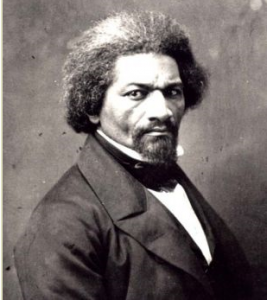 Frederick Douglass—“What to the Slave is the Fourth of July” (1852)
Frederick Douglass—“What to the Slave is the Fourth of July” (1852)
On July 5, 1852, Frederick Douglass (c. 1818–1895) was invited to address the citizens of his hometown, Rochester, N.Y. Whatever the expectations of his audience on that 76th anniversary of the signing of the Declaration of Independence, Douglass used the occasion not to celebrate the nation’s triumphs but to remind all of its continuing enslavement of millions of people.
Mr. President, Friends, and Fellow Citizens: He who could address this audience without a quailing sensation has stronger nerves than I have. I do not remember ever to have appeared as a speaker before any assembly more shrinkingly nor with greater distrust of my ability than I do this day. A feeling has crept over me, quite unfavorable to the exercise of my limited powers of speech. The task before me is one which requires much previous thought and study for its proper performance. I know that apologies of this sort are generally considered flat and unmeaning. I trust, however, that mine will not be so considered. Should I seem at ease, my appearance would much misrepresent me. The little experience I have had in addressing public meetings, in country schoolhouses, avails me nothing on the present occasion.
The papers and placards say that I am to deliver a Fourth [of] July oration. This certainly sounds large and out of the common way, for it is true that I have often had the privilege to speak in this beautiful hall and to address many who now honor me with their presence. But neither their familiar faces nor the perfect gage I think I have of Corinthian Hall seems to free me from embarrassment.
The fact is, ladies and gentlemen, the distance between this platform and the slave plantation from which I escaped is considerable—and the difficulties to be overcome in getting from the latter to the former are by no means slight. That I am here today is, to me, a matter of astonishment as well as of gratitude. You will not, therefore, be surprised if in what I have to say I evince no elaborate preparation nor grace my speech with any high-sounding exordium. With little experience and with less learning, I have been able to throw my thoughts hastily and imperfectly together; and trusting to your patient and generous indulgence, I will proceed to lay them before you.
Ida B. Wells
Ida B. Wells—“Lynching Our National Crime” (1909)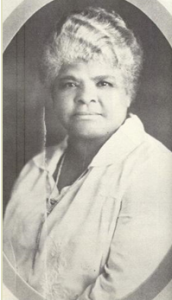
By 1909, Ida B. Wells (1862–1931) was the most prominent anti-lynching campaigner in the United States. Starting in the early 1890s, she labored mostly alone in her effort to raise the nation’s awareness and indignation about these usually unpunished murders. In 1909, however, she gained a powerful ally—the newly formed National Association for the Advancement of Colored People (NAACP). Wells delivered the following speech at the National Negro Conference, forerunner to the NAACP, which was held in New York City from May 31 through June 1, 1909.
The lynching record for a quarter of a century merits the thoughtful study of the American people. It presents three salient facts: First, lynching is color-line murder. Second, crimes against women is the excuse, not the cause. Third, it is a national crime and requires a national remedy. Proof that lynching follows the color line is to be found in the statistics which have been kept for the past 25 years. During the few years preceding this period and while frontier law existed, the executions showed a majority of white victims. Later, however, as law courts and authorized judiciary extended into the far West, lynch law rapidly abated, and its white victims became few and far between. Just as the lynch-law regime came to a close in the West, a new mob movement started in the South.
This was wholly political, its purpose being to suppress the colored vote by intimidation and murder. Thousands of assassins banded together under the name of Ku Klux Klan’s, “Midnight Raiders,” “Knights of the Golden Circle,” et cetera, et cetera, spread a reign of terror, by beating, shooting, and killing colored in a few years, the purpose was accomplished, and the Black vote was suppressed. But mob murder continued. From 1882, in which year 52 were lynched, down to the present, lynching has been along the color line. Mob murder increased yearly until in 1892 more than 200 victims were lynched, and statistics show that 3,284 men, women, and children have been put to death in this quarter of a century. During the last 10 years, from 1899 to 1908, inclusive the number lynched was 959. Of this number, 102 were white, while the colored victims numbered 857. No other nation, civilized or savage, burns its criminals; only under that Stars and Stripes is the human holocaust possible. Twenty-eight human beings burned at the stake, one of them a woman and two of them children, is the awful indictment against American civilization—the gruesome tribute which the nation pays to the color line.
W.E.B. Du Bois
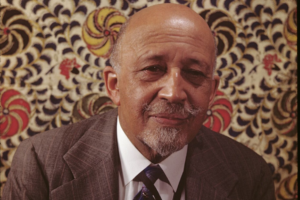 W.E.B. Du Bois—“Men of Niagara” (1906)
W.E.B. Du Bois—“Men of Niagara” (1906)
In 1906, one year after the Niagara Movement was founded, the group held its second annual meeting at Harper’s Ferry, W. Va. W.E.B. Du Bois (1868–1963), a founding member and its titular leader, delivered this address to the assembled Civil Rights activists.
The men of the Niagara Movement coming from the toil of the year’s hard work and pausing a moment from the earning of their daily bread turn toward the nation and again ask again, in the name of 10 million, the privilege of a hearing.
In the past year, the work of the Negro-hater has flourished in the land. Step by step the defenders of the rights of American citizens have retreated. The work of stealing the Black man’s ballot has progressed, and the 50 and more representatives of stolen votes still sit in the nation’s capital. Discrimination in travel and public accommodation has so spread that some of our weaker brethren are actually afraid to thunder against color discrimination as such and are simply whispering for ordinary decencies. Against this the Niagara Movement eternally protests. We will not be satisfied to take one jot or title less than our full manhood rights!
We claim for ourselves every single right that belongs to a freeborn American, political, civil, and social; and until we get these rights we will never cease to protest and assail the ears of America! The battle we wage is not for ourselves alone but for all true Americans. It is a fight for ideals, lest this, our common fatherland, false to its founding, become in truth, the land of the thief and the home of the slave, a byword and a hissing among the nations for its sounding pretensions and pitiful accomplishments.
Never before in the modern age has a great and civilized folk threatened to adopt so cowardly a creed in the treatment of its fellow citizens born and bred on its soil. Stripped of verbiage and subterfuge and in its naked nastiness, the new American creed says: “Fear to let Black men even try to rise lest they become the equals of the white.” And this is the land that professes to follow Jesus Christ! The blasphemy of such a course is only matched by its cowardice.
Marcus Garvey
Marcus Garvey—“The Principles of The Universal Negro Improvement Association” (1922)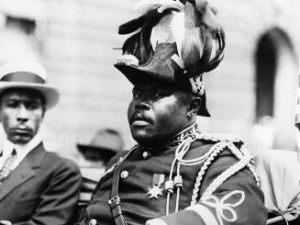
In this speech, delivered in New York City on Nov. 25, 1922, Marcus Garvey (1887–1940) explains the objectives of the Universal Negro Improvement Association (UNIA), the organization he believed would lead the worldwide movement toward Black liberation.
Over five years ago, the Universal Negro Improvement Association placed itself before the world as the movement through which the new and rising Negro would give expression of his feelings. This Association adopts an attitude not of hostility to other races and peoples of the world, but an attitude of self-respect, of manhood rights on behalf of 400 million Negroes of the world.
We represent peace, harmony, love, human sympathy, human rights, and human justice, and that is why we fight so much. Wheresoever human rights are denied to any group, wheresoever justice is denied to any group, there the UNIA finds a cause. And at this time among all the peoples of the world, the group that suffers most from injustice, the group that is denied most of those rights that belong to all humanity, is the Black group of 400 million. Because of that injustice, because of that denial of our rights, we go forth under the leadership of the One who is always on the side of right to fight the common cause of humanity; to fight as we fought in the Revolutionary War, as we fought in the Civil War, as we fought in the Spanish American War, and as we fought in the war between 1914 and 1918 on the battle plains of France and of Flanders. As we fought on the heights of Mesopotamia; even so under the leadership of the UNIA, we are marshaling the 400 million Negroes of the world to fight for the emancipation of the race and of the redemption of the country of our fathers.
We represent a new line of thought among Negroes. Whether you call it advanced thought or reactionary thought, I do not care. If it is reactionary for people to seek independence in government, then we are reactionary. If it is advanced thought for people to seek liberty and freedom, then we represent the advanced school of thought among the Negroes of this country. We of the UNIA believe that what is good for the other folks is good for us. If government is something that is worthwhile; if government is something that is appreciable and helpful and protective to others, then we also want to experiment in government. We do not mean a government that will make us citizens without rights or subjects with no consideration. We mean a kind of government that will place [our] race in control, even as other races are in control of their own governments.
Martin Luther King Jr.
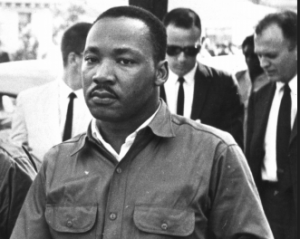 The Rev. Dr. Martin Luther King Jr.—“I Have a Dream” (1963)
The Rev. Dr. Martin Luther King Jr.—“I Have a Dream” (1963)
In what many consider one of the greatest speeches ever delivered, the Rev. Dr. Martin Luther King Jr. (1929–1968) spoke at the Lincoln Memorial on Aug. 28, 1963, during the March on Washington for Jobs and Freedom. King deftly synthesized portions of his earlier speeches into a message of the necessity for change and the potential for hope in America.
I am happy to join with you today in what will go down in history as the greatest demonstration for freedom in the history of our nation. Five score years ago, a great American, in whose symbolic shadow we stand, signed the Emancipation Proclamation. This momentous decree came as a great beacon light of hope to millions of Negro slaves had been seared in the flames of withering injustice. It came as a joyous daybreak to end the long night of captivity.
But 100 years later, we must face the tragic fact that the Negro is still not free. One hundred years later, the life of the Negro is still sadly crippled by the manacles of segregation and the chains of discrimination. One hundred years later, the Negro lives on a lonely island of poverty in the midst of a vast ocean of material prosperity. One hundred years later, the Negro is still languishing in the comers of American society and finds himself an exile in his own land. So, we have come here today to dramatize an appalling condition.
In a sense, we have come to our nation’s capital to cash a check. When the architects of our republic wrote the magnificent words of the Constitution and the Declaration of Independence, they were signing a promissory note to which every American was to fall heir. This note was a promise that all men would be guaranteed the unalienable rights of life, liberty, and the pursuit of happiness.
It is obvious today that America has defaulted on this promissory note insofar as her citizens of color are concerned. Instead of honoring this sacred obligation, America has given the Negro people a bad check; a check which has come back marked “insufficient funds.” But we refuse to believe that the bank of justice is bankrupt. We refuse to believe that there are insufficient funds in the great vaults of opportunity of this nation. So, we have come to cash this check a check that will give us upon demand the riches of freedom and the security of justice. We have also come to this hallowed spot to remind America of the fierce urgency of now. This is no time to engage in the luxury of cooling off or to take the tranquilizing drug of gradualism. Now is the time to make real the promises of democracy. Now is the time to rise from the dark and desolate valley of segregation to the sunlit path of racial justice. Now is the time to open the doors of opportunity to all of God’s children. Now is the time to lift our nation from the quicksands of racial injustice to the solid rock of brotherhood.
Former President Barack Obama
Barack Obama—“A More Perfect Union” (2008) 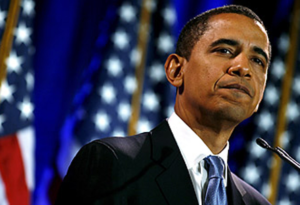
On March 18, 2008, then-Sen. Obama delivered a now-famous speech on race at Constitution Center in Philadelphia, Pa. Called “A More Perfect Union” by his campaign, addressed the role of race throughout the nation’s history and during the 2008 presidential campaign.
“We the people, in order to form a more perfect union …”—221 years ago, in a hall that still stands across the street, a group of men gathered and, with these simple words, launched America’s improbable experiment in democracy. Farmers and scholars, statesmen and patriots who had traveled across an ocean to escape tyranny and persecution finally made real their declaration of independence at a Philadelphia convention that lasted through the spring of 1787.
The document they produced was eventually signed but ultimately unfinished. It was stained by this nation’s original sin of slavery, a question that divided the colonies and brought the convention to a stalemate until the founders chose to allow the slave trade to continue for at least 20 more years and to leave any final resolution to future generations.
Of course, the answer to the slavery question was already embedded within our Constitution—a Constitution that had at is very core the ideal of equal citizenship under the law; a Constitution that promised its people liberty and justice and a union that could be and should be perfected over time.
And yet words on a parchment would not be enough to deliver slaves from bondage, or provide men and women of every color and creed their full rights and obligations as citizens of the United States. What would be needed were Americans in successive generations who were willing to do their part—through protests and struggles, on the streets and in the courts, through a civil war and civil disobedience, and always at great risk—to narrow that gap between the promise of our ideals and the reality of their time.
This was one of the tasks we set forth at the beginning of this presidential campaign—to continue the long march of those who came before us, a march for a more just, more equal, more free, more caring, and more prosperous America. I chose to run for president at this moment in history because I believe deeply that we cannot solve the challenges of our time unless we solve them together, unless we perfect our union by understanding that we may have different stories, but we hold common hopes; that we may not look the same and we may not have come from the same place, but we all want to move in the same direction—toward a better future for our children and our grandchildren.
Blackpast.org, Biography.com, oregonencyclopedia.com, history.house.gov, Brittanica.com, morehouse.edu, and Wikipedia.org contributed to this article.




